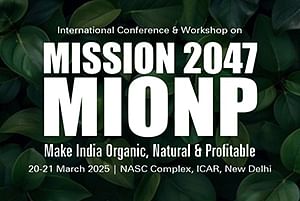
The ‘Palm Oil - Transforming Perceptions for Health and Nutrition’ seminar, jointly organized by Solidaridad, Asian Palm Oil Alliance and SEA successfully concluded on June 28, 2024 at the Brilliant Convention Center in Indore. The event brought together leading nutritionists, scientists, medical professionals and edible oil industrialists like the Solvent Extractors’ Association of India (SEA), Adani-Wilmar, Godrej Agrovet Limited to discuss the multifaceted benefits of palm oil and its role in India's edible oil landscape.
Palm oil's rich nutritional profile was a key focus of the seminar, highlighting its high content of carotenoids and balanced fatty acid composition. Experts discussed potential health benefits associated with palm oil consumption, including improved heart and brain health, antioxidant properties, and support for eye health.
The event also addressed India's growing reliance on palm oil, which now exceeds 38% of the country's total edible oil consumption. To meet this demand, plans were outlined to expand oil palm cultivation area by an additional 0.6 million hectares by 2025-26. This expansion is expected to significantly boost domestic production, with projections indicating that crude palm oil production could reach 1.12 million tonnes by 2025-26 and further increase to 2.8 million tonnes by 2029-30, marking a substantial step towards India's goal of self-sufficiency in edible oil production.
This seminar recognizes the government’s ambitious target for achieving self-sufficiency in edible oils and is linked to the National Mission on Edible Oils- Oil Palm which is an essential step towards making India ‘Aatmnirbhar’ in edible oils. Its aim is to deconstruct myths and misconceptions that exist about the relationship between health and the environmental impact of palm oil.
Atul Chaturvedi, Chairman Asian Palm Oil Alliance, stated: "India, as the world's largest importer of palm oil, is committed to becoming self-sufficient in edible oil production. Palm oil has been a staple in various food and non-food products in India for centuries. However, in recent years, misleading reports about its impact on health, nutrition, and the environment have surfaced, causing harm to our farmers, especially smallholders, and negatively affecting our economy. This seminar aims to change public perceptions about palm oil by presenting scientifically accurate information."
Dr. Shatadru Chattopadhyay, Managing Director, Solidaridad Asia, emphasized: "We are actively engaged in promoting sustainable practices in the palm oil sector through initiatives such as the India Palm Oil Sustainability (IPOS) standards platform. Despite its pivotal role, palm oil faces negative perceptions fueled by myths regarding its environmental and health impacts. These misconceptions not only harm the industry's reputation but also affect the Indian economy, particularly impacting palm oil farmers and smallholders. Our efforts focus on dispelling these myths and promoting accurate information to support both sustainable palm oil production and the livelihoods it sustains."
Ajay Jhunjhunwala, President SEA said: We are committed to promoting sustainable practices in the Indian palm oil industry. By encouraging farmers to adopt the Indian Palm Oil Sustainability Standard, we aim to ensure that our agricultural practices are environmentally friendly and socially responsible. We urge companies to support this initiative by purchasing palm oil that meets these standards.
Dr BV Mehta, Executive Director SEA, highlighted the economic significance: "India's import of approximately 9 million tons of palm oil annually underscores the critical need to improve local production. With palm oil consumption surpassing 38%, and soybean, mustard, and sunflower oils following closely, there is a pressing gap that must be addressed through enhanced local cultivation and support for our farmers. As leaders in the edible oil industry, we are committed to raising the minimum selling price of palm oil to benefit our farmers and strengthen domestic production."
Dr Suresh Motwani, Regional Head, Veg Oil Solidaridad and Secretary General APOA, commented on the exhibition: "With this unique concept of exhibiting palm oil-made products, this seminar stands as proof that palm oil is an integral part of the Indian kitchen. By dispelling myths associated with it, India can surely achieve the Prime Minister's vision of a self-reliant India in edible oil production."
Sougata Niyogi, CEO, Oil Palm Business, Godrej Agrovet Ltd, said: "The National Mission of Edible Oils – Oil Palm is a step in the right direction for our country to reduce the import of edible oil. With a potential to yield 3-4 tonnes/ha/year, it is one of the highest yielding crops compared to all vegetable oil seed crops. Requiring less water when compared to other crops like sugarcane and paddy, it also enables farmers to have an assured source of income for more than 20 years in addition to alternate source of income through intercropping. Additionally, with only agricultural land permitted for growing the crop, oil palm also aids in increasing the biodiversity in the region."
Dr. Vijaya Khader, Former Dean Acharya NG Ranga Agriculture University and Nutritionist added: "Numerous studies have substantiated the manifold benefits of palm oil across various applications, owing to its versatile characteristics in both edible and non-edible products. Before forming any opinions about palm oil, it is imperative that individuals educate themselves thoroughly about its attributes. Only then can they make informed decisions, rather than relying solely on hearsay."
The seminar succeeded in addressing common misconceptions about palm oil and highlighting its positive attributes, paving the way for a more informed and sustainable approach to palm oil production and consumption in India. With the import of RBD Palm olein oil reaching 1237 million tons, the event underscored the importance of domestic production in meeting India's growing edible oil needs.

















